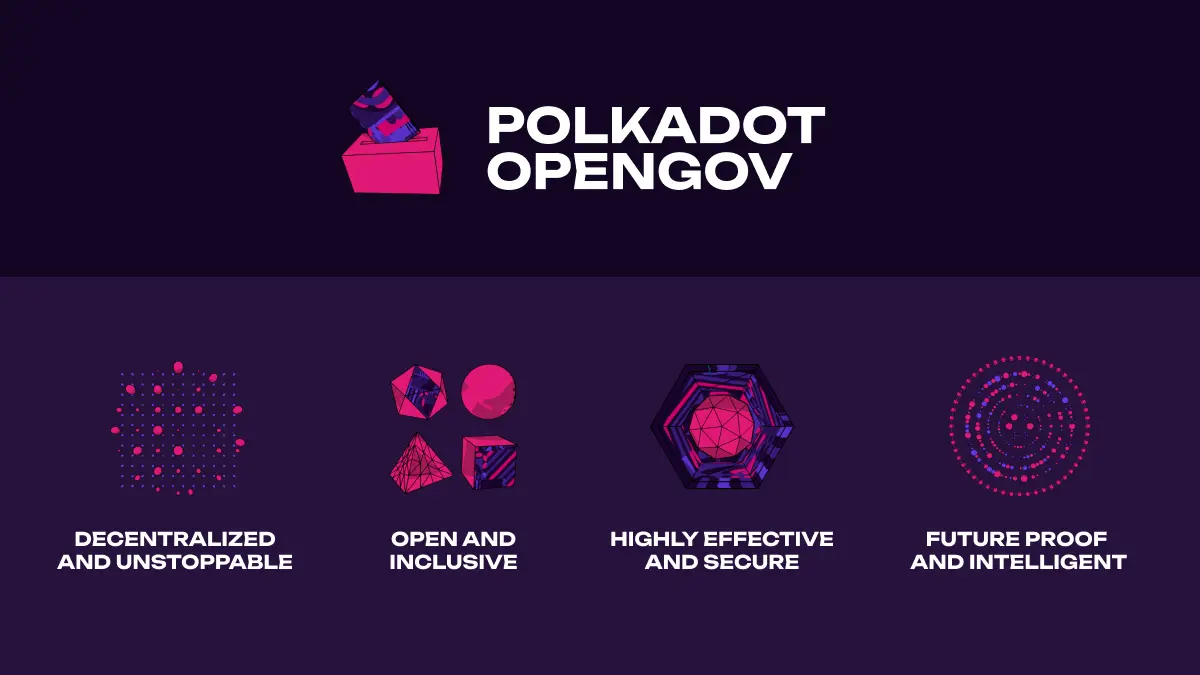Polkadot hands decision-making powers to its community with OpenGov launch
Polkadot today announces the launch of Polkadot OpenGov, transforming the decision-making process that guides Polkadot’s future evolution and putting the network’s community in direct control.
 By Polkadot•June 15, 2023
By Polkadot•June 15, 2023New on-chain governance model increases Polkadot’s decentralization

Polkadot, the next-generation blockchain network powering the movement for a better web, today announces the launch of Polkadot OpenGov, the protocol’s new governance model. This transforms the decision-making process that guides Polkadot’s future evolution, putting the network’s community in direct control. And it enables holders of the native token, DOT, to propose any new referendum at any time - and to do so as often as they wish.
Polkadot’s initial governance process, conducted on-chain, was already the most decentralized in the industry, and had the additional advantage of eliminating damaging “hard forks”. But Polkadot OpenGov takes this even further.
The advantages of Polkadot OpenGov over the network's initial governance design are as follows:
Removal of “first-class citizens”: The Polkadot Council, an elected entity that could propose referenda, cancel malicious referenda, and approve spending proposals, no longer exists. The Technical Committee, which fast-tracked certain referenda, has also been removed. Instead, a transparently elected body of experts has been introduced, called The Polkadot Fellowship. It has no hard power over the network, and cannot change parameters or move assets. It can only declare certain proposals as safe, malicious, or time-critical and can therefore identify malicious ones or facilitate quicker bug fixes. The Fellowship keeps growing with time, as core developers submit their candidacy to become members.
Simultaneous voting: Referenda are classified into different areas of importance and can run simultaneously, meaning decisions can be taken more quickly. Proposals need to fulfill certain support and approval thresholds to be enacted, protecting the community from submissions with a low level of support from passing and ensuring continued security.
Level playing field: Agile voting delegation helps drive participation, enabling participants to delegate their votes to different people, such as the Polkadot Fellowship, for different types of referenda. “Conviction voting” makes the process fairer for those with fewer tokens, who can gain voting power by agreeing to longer token lockup times.
All proposals get voted on: OpenGov ensures all proposals get a chance to be voted on in a timely predictive manner; previously only the most endorsed proposals reach the “voting period” stage. This is another first in Web3 governance and ensures there are no blind spots where decisions can be made behind closed doors.
Raul Romanutti, a member of the former Polkadot Council from its inception, said: “The initial governance model was helpful during the early stages of Polkadot’s development, for fixing bugs, making improvements to the shared security of the network, and to execute the first parachain slot auctions. After three years of adjustments, Polkadot is ready to open its doors to the new governance model, and allow the community to be in total control when it comes to initiating proposals and changes.
“OpenGov ensures one more step towards an unstoppable network, controlled by the community, for the community, with multiple opportunities for members to be able to propose network changes and a dynamic voting system that allows big and small token holders to make their voices heard.”
OpenGov comes to Polkadot after being tested on the network’s “canary” network, Kusama, for six months.
About Polkadot
Polkadot is a network that provides the technical advances necessary to make blockchain technology practical, accessible, scalable, interoperable and future-proof. It removes limitations and barriers to entry, and thereby fuels innovation, growing the decentralized technology space and bringing the Web3 vision to life.
Media inquiries: press@parity.io











